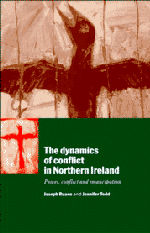Book contents
- Frontmatter
- Contents
- List of figures
- List of tables
- Preface
- 1 Introduction
- 2 Historical formations
- 3 The reconstruction of communal division
- 4 Ideology and conflict
- 5 The dynamics of conflict: politics
- 6 The dynamics of conflict: the economy
- 7 The dynamics of conflict: culture
- 8 The British context of the Northern Ireland conflict
- 9 The Republic of Ireland and the conflict in Northern Ireland
- 10 The international context
- 11 An emancipatory approach to the conflict
- Epilogue
- Appendix
- Bibliography
- Index of names
- Index of subjects
9 - The Republic of Ireland and the conflict in Northern Ireland
Published online by Cambridge University Press: 18 December 2009
- Frontmatter
- Contents
- List of figures
- List of tables
- Preface
- 1 Introduction
- 2 Historical formations
- 3 The reconstruction of communal division
- 4 Ideology and conflict
- 5 The dynamics of conflict: politics
- 6 The dynamics of conflict: the economy
- 7 The dynamics of conflict: culture
- 8 The British context of the Northern Ireland conflict
- 9 The Republic of Ireland and the conflict in Northern Ireland
- 10 The international context
- 11 An emancipatory approach to the conflict
- Epilogue
- Appendix
- Bibliography
- Index of names
- Index of subjects
Summary
In contrast to Britain – a post-imperial state adjusting to its decline from world economic and political preeminence – the Republic of Ireland is a post-colonial state seeking to overcome the legacy of the past and to realise its foundational goals. We look at the ways in which it has conceived and pursued its national project, at the changes in its public culture and in attitudes to partition. Finally we look at the ways in which Southern society, culture and politics impact on the conflict in the North and the potential that exists within the Irish context for resolving the conflict.
Independent Ireland's national project
From its foundation, the policies of the Southern Irish state were framed within a consciously pursued national project which had wide public support. The goal was to establish political, cultural and economic independence from Britain, to protect and develop a distinctive Irish culture, to develop the economy and to secure a respected place for Ireland in the international community of nations. The project had a decolonising and a modernising aspect. The decolonising strand sought to dismantle the British legacy in Ireland and to build a new and authentically Irish state and society; the modernising strand sought to develop Ireland as a modern society fully in line with contemporary Western European norms. The two sets of goals usually harmonised but could conflict – for example, if decolonisation demanded distance from Britain, modernisation frequently demanded close contact. Emphases and priorities within the project, and the degree of commitment to it, differed between groups and over time. Decolonisation was given priority during the first decades of the new state; in the 1960s the emphasis shifted to modernisation.
- Type
- Chapter
- Information
- The Dynamics of Conflict in Northern IrelandPower, Conflict and Emancipation, pp. 232 - 265Publisher: Cambridge University PressPrint publication year: 1996
- 1
- Cited by



